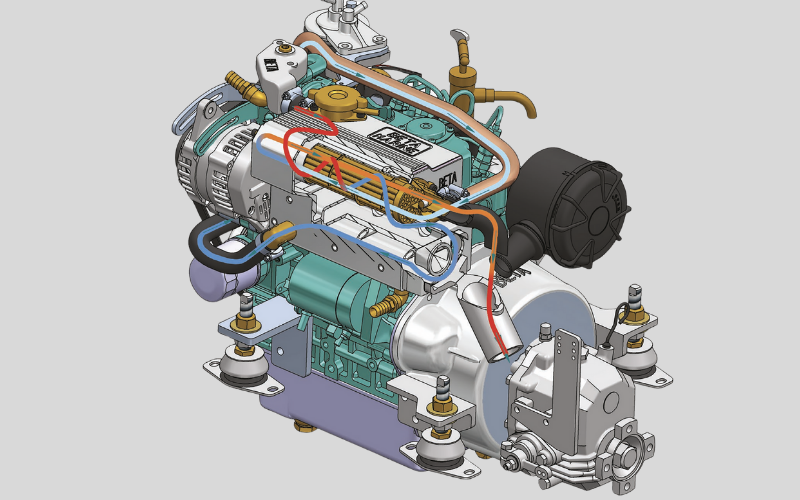Understanding Your Marine Diesel Engine
The marine diesel engine serves as the backbone of many vessels, combining power and durability in a compact design. Its proper maintenance is not just crucial for the engine’s lifespan but also for ensuring a smooth sailing experience. Without regular checks, boat enthusiasts may find themselves grappling with unexpected issues during their voyages.
General Principles of Marine Diesel Engines
Marine diesel engines are designed for heavy-duty performance, adapting technology from commercial applications like trucks and construction machinery. These engines thrive on consistent use; infrequent operation can lead to several problems. For instance, a lorry may run for around 20,000 hours in a decade, while a typical yacht engine may log only 600 hours. Such inactivity causes components like raw water impellers and alternator belts to seize or deform.
Moreover, too much low-speed running can cause glazing, a condition where piston rings polish the internal surfaces of cylinders. Thus, it is vital to avoid short running times, instead opting for longer, moderate-speed operations to ensure engine health.
Pre-Start Checks for Diesel Engines
A meticulous inspection prior to ignition can prevent problems later on. Experts recommend the following routine checks whenever a voyage is planned:
- Visual Inspection: Ensure no loose components (e.g., batteries and cables) and clean the engine tray to spot leaks easily.
- Raw Water Inlet: Check the inlet valve and filter. The engine requires water to cool effectively, so ensure the inlet is operational.
- Raw Water Filter: Remove and clean or replace the filter to avoid restricting flow.
- Belts: Inspect the V-belt for wear and proper tension, as this drives important components like the alternator.
- Cooling System: Verify the header tank coolant level using a simple fingertip measurement.
- Engine Oil: Check the dipstick; it should be at the top mark for optimal performance.
- Gearbox and Fuel Filter: Similar checks apply here; ensure that levels are correct and filters free from obstruction.
- Fuel Check: Always ensure you have enough fuel for your journey and prefer marine diesel to minimize water content.
- Driveshaft Coupling: Ensure connections are secure, especially after sudden stops.
- Engine Mounts and Linkages: Regularly check these for wear, ensuring that they are secured and functioning properly.
Start-Up Checks: Getting Ready to Go
Before turning the key, several indicators need to be confirmed:
- Warning Lights: Ensure all dashboard lights activate, indicating operational systems.
- Check for Smoke: A puff of initial smoke is normal, but it should settle shortly after startup.
- Water Output: Ensure water is expelled from the exhaust to confirm cooling functions.
- Fuel Fillers: Maintain O-rings and cleanliness to prevent contamination.
Engine Diagnostics: Troubleshooting Issues
Occasionally, diesel engines may exhibit issues that necessitate immediate action. Here’s how to troubleshoot common problems:
- No Start Issues: Low battery, faulty connections, or blocked fuel filters could be the culprit.
- Overheating: Check for an unblocked raw water inlet and clean filters.
- Power Loss: Inspect for wraps around the propeller or airflow blockage; these can severely affect engine performance.
- Unusual Smoke Colors: Black smoke indicates over-fuelling, while white smoke suggests unburned fuel or condensation problems.
Adopting Proper Installation Practices
Engine placement is vital. The installation should grant easy access to components to facilitate maintenance checks. Consider creating access hatches if the engine is hard to reach.
Final Reminders for Owners
- Always start with the dipstick in place.
- Be cautious about dropping tools or components into the engine compartment.
- Secure all fittings and connections with grease to prevent corrosion.
- Prioritize safety: remove the key from the ignition while working.
Experienced marine diesel mechanics emphasize the importance of thorough knowledge and routine checks for any boat owner. Maintenance fosters reliability, efficiency, and safety while navigating the open waters. This attention to detail can have a positive ripple effect, enhancing the overall boating experience.
Explore the world of boating possibilities with GetBoat.com, where enthusiasts find a vibrant community and unmatched platform for boat rentals and more!
Understanding marine diesel engines is essential for anyone eager to explore the wonders of the ocean. Each adventure opens the door to new locations, culture, and the rhythms of life by the sea. If planning your next maritime journey, consider the enriching experience of renting a boat, as each destination reveals itself in its waters, just as deeply as through its cuisine and architecture. Discover more reliable options at GetBoat.com.
In conclusion, maintaining your marine diesel engine is not just about preserving machinery; it is about ensuring experiences on the water are as smooth and enjoyable as possible. With the right checks in place, and a little preparation, anyone can enjoy the majesty of ocean adventures!

 Essential Maintenance for Marine Diesel Engines">
Essential Maintenance for Marine Diesel Engines">
